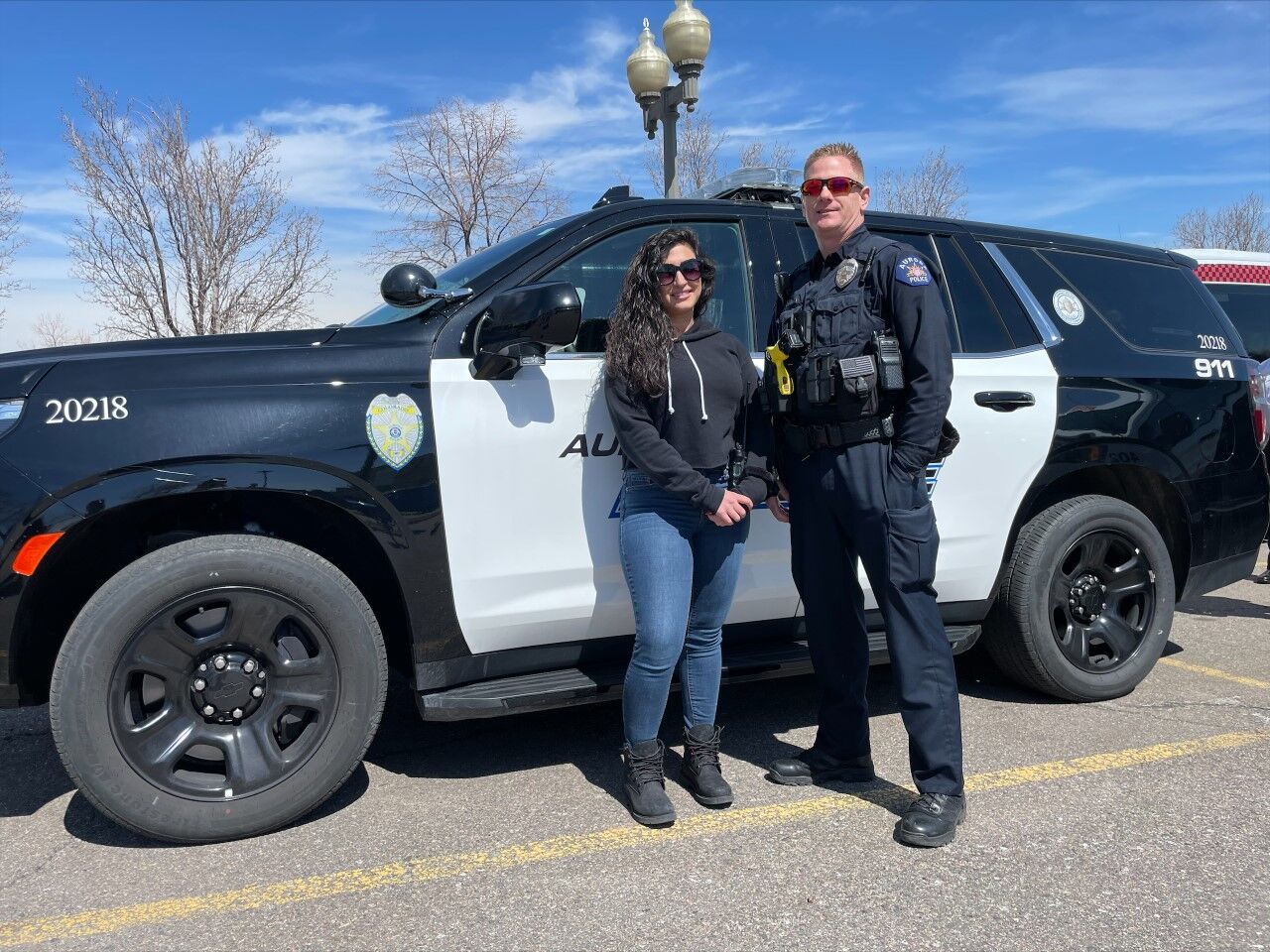Aurora police’s crisis response teams saw success in 2023

FILE PHOTO: Aurora Police Officer David Campbell (right) and Aurora Mobile Response Team Clinician Tandis Hashemi work for the City of Aurora's crisis intervention programs. Hashemi serves on the AMRT, which is an alternative resource to policing that the city uses to address residents' behavioral health crises. Thanks to the unit "we are able to meet the community's needs better," Hashemi said.
Jessica Gibbs/Denver Gazette
Aurora Police Department’s co-response programs, which pair mental health clinicians with emergency responders, saw growth and success in 2023 — diverting hundreds of people from jail or emergency rooms.
In a recent Aurora public safety committee meeting, staff presented the 2023 outcomes of the city’s co-responder programs, which include Aurora Mobile Response Team (AMRT) and Crisis Response Team (CRT).
To pull data for the programs, staff used mental health-related key words to determine that more than 19,000 calls for service could have benefitted from a mental health response in 2023.
Of those calls, CRT responded to over 2,500 calls, or about 13.6 percent, and the AMRT responded to 436 calls, or about 2.2 percent of the calls.
The city currently has five CRT units and three AMRT units.
Overall, the programs diverted more than 250 people from jail, criminal charges or an unnecessary trip to an emergency room, according to Courtney Tassin, the crisis intervention program manager.
Calls for service generally last an average of 50 to 80 minutes, but can range from 15 minutes to four hours, Tassin said.
When responders arrive, they do an initial safety assessment, then do behavioral health screenings and assessments. From there, clinicians help people identify support systems, coping skills and safe environments.
The person’s situation will then be resolved on scene, directed to a walk-in crisis center, diverted to an emergency department or to jail.
Half of the calls answered in 2023 were resolved on-scene, Tassin said, leaving the people safe in their home environment.
Only 1 percent of the calls resulted in jail time and 8 percent have resulted in an involuntary mental health hold, Tassin said.
When it comes to repeat callers, the program clinicians determine ways to prevent them from calling 911 and instead rely on other care providers, Tassin said.
In one case, Tassin oversaw a situation in which a person called 60 times every day for three months. After intervention and help from their teams, connecting the person with resources through Aurora Mental Health, the person started only calling every three weeks and, more recently, has stopped calling despite still living in Aurora.
AMRT and CRT were established in the last six years and were approved for funding from council in 2023, allowing them to expand.
Prior to that council decision, CRT was grant funded and AMRT was a six-month pilot program.
Back in January 2023, the city also partnered with UCHealth to bring on six new clinicians and two care coordinators for the programs.
The AMRT debuted in September of 2021 and is an “alternative response to handling behavioral health crises,” according to the city.
They pair a mental health clinician from UCHealth with a paramedic or EMT from Falck Rocky Mountain to provide trauma-informed crisis intervention and de-escalation services for those having behavioral health crises. This can include mental health, depression, homelessness, poverty, substance use issues and other issues that may not require a law enforcement response.
AMRT staff are not armed and also do not respond to incidents involving violence, criminal acts or life-threatening medical situations. They can provide basic first aid and behavioral health assessments.
CRT is part of Aurora Police Department and pairs crisis intervention-trained police officers with mental health clinicians. It was established in 2018 and provides “trauma-informed crisis care,” according to the city.
“CRT and AMRT are an invaluable resource for the community we serve,” previous APD Police Chief Art Acevedo said in a news release at the time of the city’s partnership with UCHealth. “We look forward to a continued partnership with both programs to ensure the most appropriate resources are available for our neighbors experiencing difficulties due to mental health crises.”
Along with these efforts, Aurora Fire Rescue partnered with Aurora911 and Falck Rocky Mountain late last year to start a program called Right Response, which dispatches medical calls according to the incident’s acuity rather than taking a one-size-fits-all approach.
Similar to AMRT and CRT, Right Response has a goal of dispatching care providers to situations that may not require a full lights and sirens response.
Right Response came to AFR about a year after the implementation of Aurora911’s Nurse Navigation program, which routes 911 callers with non-emergent injuries or illnesses to a Colorado State Licensed nurse for assessment and referral to the most appropriate medical care.




